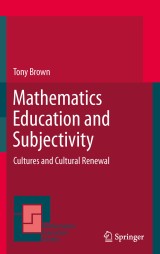Details

Mathematics Education and Subjectivity
Cultures and Cultural RenewalMathematics Education Library, Band 51
|
96,29 € |
|
| Verlag: | Springer |
| Format: | |
| Veröffentl.: | 09.07.2011 |
| ISBN/EAN: | 9789400717398 |
| Sprache: | englisch |
| Anzahl Seiten: | 216 |
Dieses eBook enthält ein Wasserzeichen.
Beschreibungen
<p>This book is centrally concerned with how mathematics education is represented and how we understand mathematical teaching and learning with view to changing them. It considers teachers, students and researchers. It explores their mathematical thinking and the concepts that this thought produces. But also how these concepts acquire cultural layers that mediate our apprehension. The book examines some of the linguistic and socio-cultural filters that influence mathematical understanding. But above all it introduces some contemporary theories of human subjectivity, in which subjectivity is seen primarily as consequential to, rather than productive of, our attempts to represent or categorise the world in which we live. That is, our sense of who we are results from our attempts to see ourselves against the various versions of the world that we encounter. Such theories trouble the very notion of mathematical "concepts" as apprehended by "humans". And in foregrounding this concern with subjectivity the book considers mathematics rather differently to styles more familiar in many instances of mathematics education research. The book proposes that mathematics can provoke us to think differently about our world and as a result enable our transformative capacities. Such an orientation may disturb our understanding of what mathematics is, how it exists in an "objective" sense, insofar as mathematical objects can be derived from social filters being applied to the world, but also serve as filters on the world capable of producing new social entities.</p><p> </p>
<p>About the author. - Acknowledgements. - <b>1</b> Introduction. – <b>2 </b>The regulation of spatial perception.- <b>3 </b>Cultural mediation of mathematics.- <b>4 </b>Teacher conceptions of curriculum. <b>5</b> Subjectivity in mathematics education research.- <b>6</b> Lacanian subject of mathematical learning.- <b>7</b> The cultural renewal of mathematical learning.- <b>8 </b>The political shaping of mathematical learning.-<b> 9</b> Concluding remarks.- References.- Index.</p>
<p>Originally from London, <b>Tony Brown</b> was educated in Canterbury and Exeter, before moving to Holland Park School in central London where he taught mathematics for three years. This was followed by three years as a mathematics teacher educator for Volunteer Services Overseas in Dominica in the Caribbean. In 1987 he completed his PhD at Southampton University. His doctoral research focused on language usage in mathematics classrooms, especially where the fluent use of English could not be assumed. After a spell as a mathematics coordinator in a middle school on the Isle of Wight, Tony moved to Manchester Metropolitan University in 1989. Tony has been the leader for doctoral studies in education as well as participating in a range of other courses and became Professor of Mathematics Education in 2000. Projects have included: Economic and Social Research Council funded studies examining teacher education; piloting a distance-teaching programme enabling British volunteers based in Africa to research their own teaching practice within a programme of professional development; and, a General Medical Council funded project on how senior doctors learn. Tony also spent two years on leave from Manchester at the University of Waikato where he became the first Professor of Mathematics Education in New Zealand. There he led a project funded by the New Zealand Council for Educational Research<b> </b>on the experiences of Pasifika teachers working in New Zealand schools.</p><p>Tony has published two other books in the Mathematics Education Library series. <i>Mathematics education and language </i>outlines his interest in mathematics in schools. <i>Becoming a mathematics teacher </i>(with Olwen McNamara) considers the formation of practices of new primary school teachers. Meanwhile, <i>Action research and postmodernism </i>(with Liz Jones) provides a theoretical perspective on teachers carrying out practitioner research within higher degrees. <i>Regulativediscourses in education </i>(with Dennis Atkinson and Janice England) considers teacher practices through psychoanalytic theory. <i>The psychology of mathematics education</i>, edited by Tony,<i> </i>introduces psychoanalytic theory as an alternative to more cognitive understandings of psychology. Tony has also written extensively in journals such as <i>Educational Studies in Mathematics, for the learning of mathematics </i>and the<i> British Educational Research Journal</i>.</p>
<p>This book rethinks mathematical teaching and learning with view to changing them to meet or resist emerging demands. Through considering how teachers, students and researchers make sense of their worlds, the book explores how some linguistic and socio-cultural locations link to prevalent conceptions of mathematics education. The locations include classroom mathematics, spatial awareness, media images of mathematics, curriculum development, teacher education and mathematics education research itself. The book introduces cutting edge theories of subjectivity that trouble more familiar psychological theories of “humans” apprehending mathematical “concepts”. Rather, it suggests that our senses of self and of mathematics result from self-reflections within the various localities in which we live. In foregrounding subjectivity the book shows how mathematics can provoke alternative ways of thinking towards enlivening our transformative capacities. Learning itself is depicted as participation in cultural renewal, where the very mathematics encountered is becoming something new. Addressing teachers, teacher educators and researchers, the book invites the reader to contemplate alternative trajectories of change into fresh ways of being.</p>
Considers how learners and teachers in different cultural settings construct mathematical knowledge as a result of their socially determined needs. Introduces cutting edge theories of subjectivity Shows how mathematics can provoke alternative ways of thinking towards enlivening our transformative capacities
Diese Produkte könnten Sie auch interessieren:

The Professional Education and Development of Teachers of Mathematics

von: Ruhama Even, Deborah Loewenberg Ball

96,29 €

Challenging Mathematics In and Beyond the Classroom

von: Edward J. Barbeau, Peter J. Taylor

149,79 €

Learning and Instructional Technologies for the 21st Century

von: Leslie Moller, Douglas M. Harvey

96,29 €













